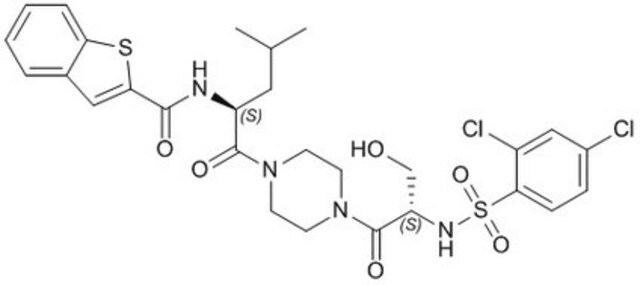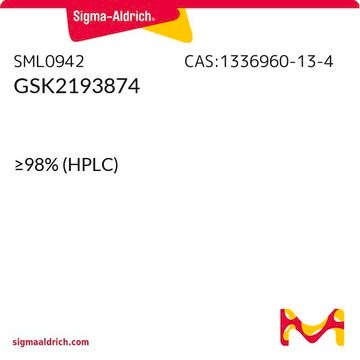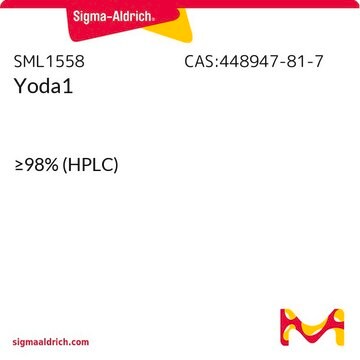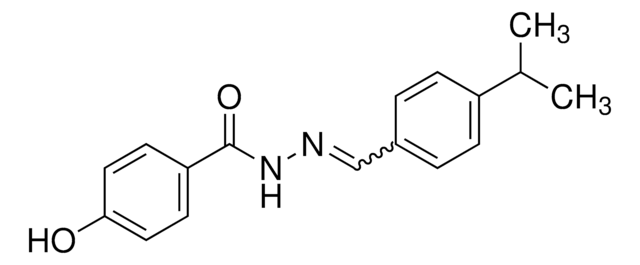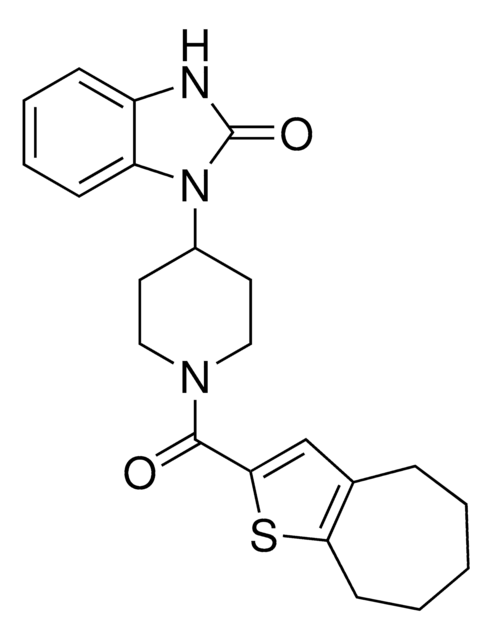G0798
GSK1016790A
≥98% (HPLC), solid, TRPV4 channel agonist
Sinónimos:
GSK101, (N-((1S)-1-{[4-((2S)-2-{[(2,4-Dichlorophenyl)sulfonyl]amino}-3-hydroxypropanoyl)-1-piperazinyl]carbonyl}-3-methylbutyl)-1-benzothiophene-2-carboxamide
About This Item
Productos recomendados
product name
GSK1016790A, ≥98% (HPLC)
Análisis
≥98% (HPLC)
formulario
solid
color
white
solubilidad
DMSO: >10 mg/mL
emisor
GlaxoSmithKline
temp. de almacenamiento
−20°C
cadena SMILES
CC(C)C[C@H](NC(=O)c1cc2ccccc2s1)C(=O)N3CCN(CC3)C(=O)[C@H](CO)NS(=O)(=O)c4ccc(Cl)cc4Cl
InChI
1S/C28H32Cl2N4O6S2/c1-17(2)13-21(31-26(36)24-14-18-5-3-4-6-23(18)41-24)27(37)33-9-11-34(12-10-33)28(38)22(16-35)32-42(39,40)25-8-7-19(29)15-20(25)30/h3-8,14-15,17,21-22,32,35H,9-13,16H2,1-2H3,(H,31,36)/t21-,22-/m0/s1
Clave InChI
IVYQPSHHYIAUFO-VXKWHMMOSA-N
Aplicación
- to stimulate transient receptor potential vanilloid 4 (TRPV4)-mediated currents in Xenopus laevis oocytes
- to stimulate cells in Ca2+ level measurement in human retinal capillary endothelial cells (HRCECs)
- to study the role of TRPV4 channels in brain injury after intracerebral hemorrhage (ICH)
- to trigger the opening of TRPV4 channels in bovine nucleus pulposus cells or Hanks′ Balanced Salt Solution
Acciones bioquímicas o fisiológicas
Características y beneficios
Código de clase de almacenamiento
11 - Combustible Solids
Clase de riesgo para el agua (WGK)
WGK 1
Punto de inflamabilidad (°F)
Not applicable
Punto de inflamabilidad (°C)
Not applicable
Certificados de análisis (COA)
Busque Certificados de análisis (COA) introduciendo el número de lote del producto. Los números de lote se encuentran en la etiqueta del producto después de las palabras «Lot» o «Batch»
¿Ya tiene este producto?
Encuentre la documentación para los productos que ha comprado recientemente en la Biblioteca de documentos.
Los clientes también vieron
Artículos
We offer many products related to transient receptor potential channels for your research needs.
Nuestro equipo de científicos tiene experiencia en todas las áreas de investigación: Ciencias de la vida, Ciencia de los materiales, Síntesis química, Cromatografía, Analítica y muchas otras.
Póngase en contacto con el Servicio técnico